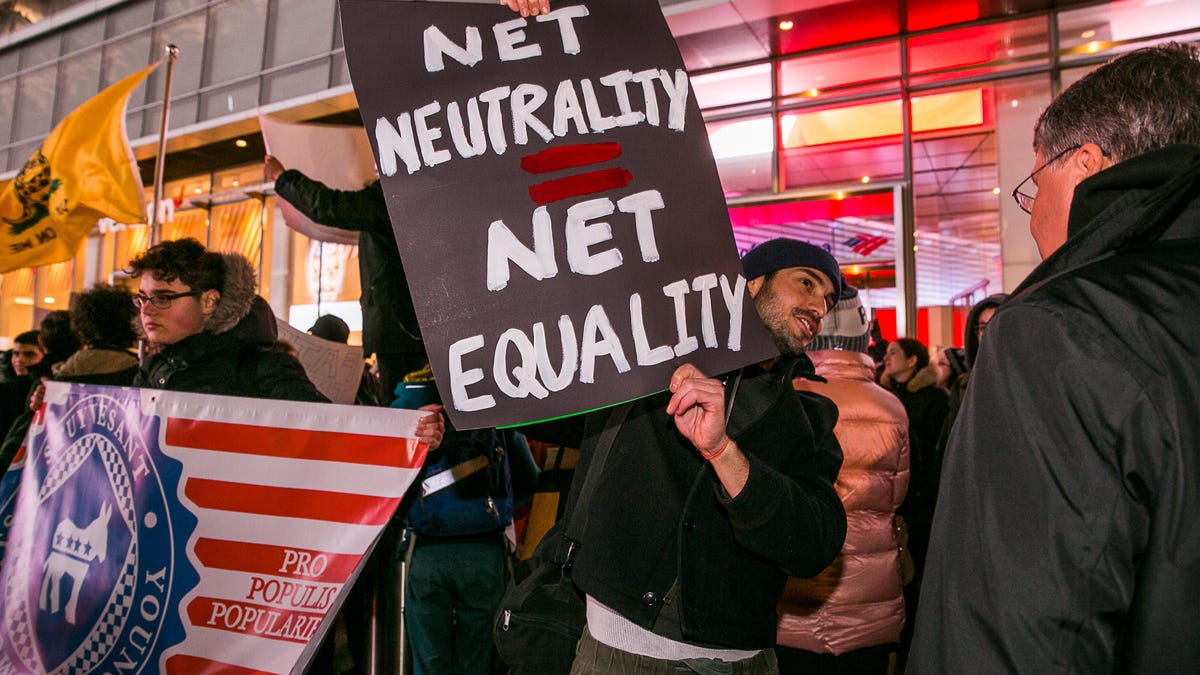Net neutrality rules will end June 11 with the FCC's final say-so
Get ready for the "light-touch approach" to the internet that Ajit Pai's been championing.

The Federal Communications Commission's 2015 net neutrality rules will officially be dead as of June 11, the agency said Thursday.
Those rules, instituted during the Obama administration, were meant to keep broadband and wireless providers from slowing or blocking internet traffic. Then last December, the Republican-led FCC under President Donald Trump began the rollback of those rules, eliminating what Chairman Ajit Pai calls "heavy-handed, utility-style regulation."
Pai, who maintains the old rules were unnecessary because the internet has always been free and open, said the rollback will restore a light-touch style of regulation to the internet.
FCC Chairman Ajit Pai.
"The Internet wasn't broken in 2015, when the prior FCC buckled to political pressure and imposed heavy-handed Title II rules on the Internet economy," Pai said in a statement. "Now, on June 11, these unnecessary and harmful Internet regulations will be repealed and the bipartisan, light-touch approach that served the online world well for nearly 20 years will be restored."
Even though the FCC had voted to approve Pai's "Restoring Internet Freedom" proposal back in December, the net neutrality rules have still technically been on the books due to a drawn-out bureaucratic process for implementing government regulations. The rules were posted in the the Federal Register in February. Last month, some of the provisions went into effect, but key parts of the order had to wait until the Office of Management and Budget signed off on them.
The FCC said in its statement Thursday that the OMB approved those measures on May 2. It set June 11 as the effective date of the new framework to give providers time to comply with a transparency requirement, which Pai says will provide consumers with more information about their broadband service.
Though many people agree with the basic principles of net neutrality, the 2015 rules had been a lightning rod for controversy. That's because to get the rules to hold up in court, the FCC under the Democrats had reclassified broadband networks so that they fell under the same strict regulations that govern telephone networks.
Supporters of net neutrality said this was necessary to ensure the rules could stand up to court challenges. But opponents, like Pai and big broadband companies like AT&T, Comcast and Verizon feared this classification of broadband gave the government too much control to do things like set prices or force providers to share their network infrastructure with competitors.
The fight has become highly politicized, with Democrats in Congress and many internet companies, such as Google and Facebook, strongly voicing their support. A majority of the public supports net neutrality as well.
But many Republicans in Congress have supported Pai's repeal, arguing as the industry has argued that the rules hurt innovation and investment in network infrastructure.
Jessica Rosenworcel, the only Democrat left on the FCC since the departure of Mignon Clyburn last month, said in a statement Thursday that the FCC's removal of the 2015 rules is "profoundly disappointing."
"The agency failed to listen to the American public and gave short shrift to their deeply held belief that internet openness should remain the law of the land," she said. "The FCC is on the wrong side of history, the wrong side of the law, and the wrong side of the American people. It deserves to have its handiwork revisited, reexamined, and ultimately reversed."
Rosenworcel, who voted for the 2015 rules, promised to continue "making a ruckus to support net neutrality," and she urged others to do the same.
It's not over yet
Other Democrats and net neutrality supporters have also vowed to keep fighting to preserve the old rules. Democrats in the Senate have banded together and successfully enacted a legislative tool called the Congressional Review Act (CRA) to halt the FCC's repeal of the 2015 net neutrality rules (see how all the Senators voted here). Under this law, Congress can repeal regulation set by a government agency within 60 legislative days of that regulation being published in the Federal Register.
On Wednesday, senators presented a petition to force a vote on a resolution to undo Pai's rollback. They expect to vote on the resolution early next week. Currently, all 49 Democrats and one independent in the Senate support the measure, as well as one Republican, Sen. Susan Collins of Maine. Just one more vote is needed to pass the resolution in the Senate. But it still faces an uphill battle since it also needs to pass the Republican-controlled House and get President Trump's signature.
Net neutrality activists and websites like Etsy, Tumblr, Postmates, Foursquare and Twilio are participating in a "Red Alert" online protest to get the public to contact their lawmakers to support the resolution.
But even if the legislative efforts fail, the fight isn't over. Several tech companies, including Vimeo, Mozilla, Kickstarter, Foursquare and Etsy, as well as 22 state attorneys general, have already filed lawsuits to preserve net neutrality protections.
There are also more than two dozen states, including California and New York, considering legislation to reinstate the rules within their borders. Earlier this year, Washington became the first state to sign such legislation into law. Governors in several other states, including New Jersey and Montana, have signed executive orders requiring ISPs that do business with the state to adhere to net neutrality principles.
First published May 10 at 6:42 a.m. PT.
Updated at 8:12 a.m. PT: Added statements from the FCC and background information.
The Smartest Stuff: Innovators are thinking up new ways to make you, and the things around you, smarter.
It's Complicated: This is dating in the age of apps. Having fun yet?



